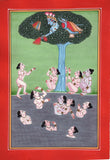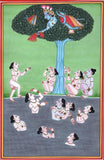Krishna and the Bathing Gopis
- Subject: Kangra Pahari Miniature Art
- Paint Material: Opaque stone & gold colors
- Base Material: Handmade Paper (unframed)
- Size: 6 in. wide and 9 in. tall (15 cms X 23 cms)
- Age: Modern Handmade Art
- Country of origin: India
- Free Shipping Worldwide & No hassle return
Add a festive touch to your home with the beauty of this exquisitely detailed & stunningly beautiful handmade miniature art made in the style of the Kangra Pahari school.
Kangra painting is the pictorial art of Kangra, named after Kangra, Himachal Pradesh, India, a former princely state, which patronized the art. Pahari paintings, as the name suggests, were paintings executed in the hilly regions of India, in the sub-Himalayan state of Himachal Pradesh. It is in the development and modification of Pahari paintings, that the Kangra School features. Kangra paintings belong to the school of Pahari paintings that were patronized by the Rajput rulers between the 17th and 19th centuries.
The striking feature of Kangra paintings is the verdant greenery it depicts. The style is naturalistic, and great attention is paid to detail. The Kangra paintings feature flowering plants and creepers, leafless trees, rivulets and brooks. The Kangra painters employed cool and fresh colors and with the lyrical blending of form and color.
The focal theme of Kangra painting is Shringar (the erotic sentiment). The subjects seen in Kangra painting exhibit the taste and the traits of the life style of the society of that period. The love story of Radha and Krishna which was the main source of spiritual experience, portrayed incidents from the life of the young Krishna, against the Brindavan forest or river Yamuna.
In the miniature featured here, Krishna is stealing the garments of the Gopi girls, The story is just symbolic. Krishna did not participate in human relations with the gopis ('cowherd maidens'). The gopis represent human beings - their clothes represent our attachments to this world (and our limited thinking). By taking away their clothes and asking them to come to him for it - he is is trying to teaches us to put away our worldly attachments and to go to him in a purified state. Once we surrender to him, the clothes will be given back because we will have understood their limited worth/significance.
Fill your world with beauty and wonder with this exceptional Kangra Pahari artwork. Buy it today.







